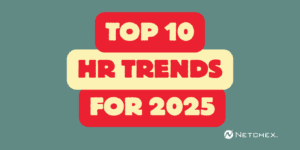Share
HR software makes it easier to run payroll and manage benefits, but business owners often balk at the up-front costs and eventual ROI.
As HR departments build closer connections with the C-suite, they need to be able to explain the practical benefits of spending time and money on HR tech.
The Need for HR Technology
HR technology is a blanket term used to describe a collection of software designed to help businesses recruit, hire, train, and engage with employees while streamlining workforce management through simplified.
It also assists in unifying core HR functions, eliminating costly redundancies, and synchronizing data to inform decision-making. These software solutions are often automated and even supported by artificial intelligence.
HR software providers offer all kinds of solutions—from payroll automation and biometric timekeeping to online training and employee engagement. Integrated software makes it easy to automate processes, transferring data between related systems.
The right HR technology does way more than just administrative tasks. It empowers employees to be informed and engaged. HR technology should not only be time saving and cost effective, it should also be flexible, intuitive, and scalable to meet your growing workforce demands. With Netchex, you can bundle all your HR software as an all-in-one product. Learn more about Netchex’s HR technology solutions.
KEY TAKEAWAYS:
- Over 80% of HR teams lack digital tools, impacting efficiency and decision-making
- HR software streamlines processes and reduces errors, as well as provides vital insights
- Self-service is a new modern standard in HR
- HR technology will help you meet worker expectations while also maintaining compliance with labour regulations
HR Technology is a Priority for Businesses
The vast majority of HR teams (over 80%) polled report that they lack the necessary digital tools to execute effectively (source: Forbes)
Technology has advanced rapidly on several fronts—from remote collaboration to generative AI—but the boom in HR software is still in its early stages.The global market is expected to double over the next few years, and so the right HR technology is still a top priority for competitive businesses.
As a 20 billion dollar industry in 2024, the market for HR software is projected to reach 44 billion dollars by 2031 (source: Verified Market Research)
Beyond the Cost: HR Software ROI
The standard formula for calculating ROI begins with adding up the gains and savings of implementing HR software. ROI can then be found by dividing that result by the total cost and then multiply by 100 for total HR software ROI.
Costs include installation, maintenance, and subscription services. But as you can imagine, it’s harder to put a specific dollar value on employee satisfaction, boosted retention, and reliable compliance.
“Greater functionality” is one of the most popular reasons why companies implement HR software, and the biggest benefits of functions like streamlined reporting are often indirect. Here are just a few of the reasons why businesses invest in HR tech:
Simplify HR Processes with Technology
HR software streamlines and automates the most tedious routines from onboarding paperwork to payroll. Without the constant rush to manually complete HR tasks, staff can pay more attention to big picture challenges like employee satisfaction and retention.
Saving Time by Reducing Human Error
HR staff get tired of correcting missed punches, and those work hours add up. Self-service portals allow employees to check their accrued leave and update contact information. It’s hard to quantify exactly how much time and energy is spent correcting human errors, but automation removes opportunities for the most common mistakes.
Successful HR ultimately boosts productivity, but the results may not have a clear cause-and-effect relationship with any one HR initiative or software change.
Enhancing employee experience and engagement
Even at the height of the “quiet quitting” phase, nobody wanted to hate their job. Employees want to be engaged and motivated. HR staff can boost engagement with stay interviews and surveys to promote a culture of feedback. HR software includes tools for communication and performance management.
Accessing data-driven insights
Metrics like tardiness and productivity are only the beginning. Automation with HR software gives you fast reporting insights that were never practical with manual calculations. Use AI for HR to identify and analyze trends in the surplus of available data.
Ensuring compliance and reducing risk
Has your company had to pay fines or penalties for falling out of compliance? If not, then it can be hard to estimate the potential cost of compliance issues in the future. While HR is already responsible for ensuring compliance, software dramatically reduces the opportunities for human errors, minimizing the risk of costly fines and penalties that can damage your reputation and standing
Streamlining workforce planning and management
When managers work to develop new talent, they can be accused of playing favorites. HR software makes it easier to give everyone access to training and advancement opportunities. Internal talent mobility boosts retention when everything is fair and equitable.
Save time and money
Time is money, but it’s hard to calculate the work hours wasted with inefficient time clocks and manual paperwork.
When asking for upgrades to HR software, ROI can be estimated by the cumulative costs of these kinds of inconveniences.Show how qualitative problems like employee frustration become major expenses like turnover. Replacing an employee costs anywhere from half to two-times the employee’s salary.
Improve communication and collaboration
Have you heard (or used) the statement, “this meeting could have been an email?” Aside from email, dozens of remote collaboration tools offer efficient alternatives to face-to-face meetings. Document sharing software and online training courses both allow everyone to participate when it fits their schedule, not derailing more important tasks.rs on topics like preventative care and nutrition. Connect your own staff with resources like free flu shots and on-site screenings.
Leveraging The Right Tools to Improve HR Management
Human resources teams need to balance many moving pieces. They must create, communicate, and maintain policies that support employees while protecting the organization they work for. Everything must be carefully documented, from hiring to training to accommodations.
The right strategies, policies, and technology can make your job much easier. Use tools available to you, like hiring platforms or learning management systems, to streamline tasks while maximizing the results.
Want to improve your HR processes and boost employee engagement?
Discover how Netchex can improve your company’s HR software ROI:
Related articles

All-in-One vs. Piecemeal HR Tools: What the Data Says

Solving Auto Dealership HR & Payroll Pain Points: The Best Practices Guide 2025-2026

Human Resources Technology

